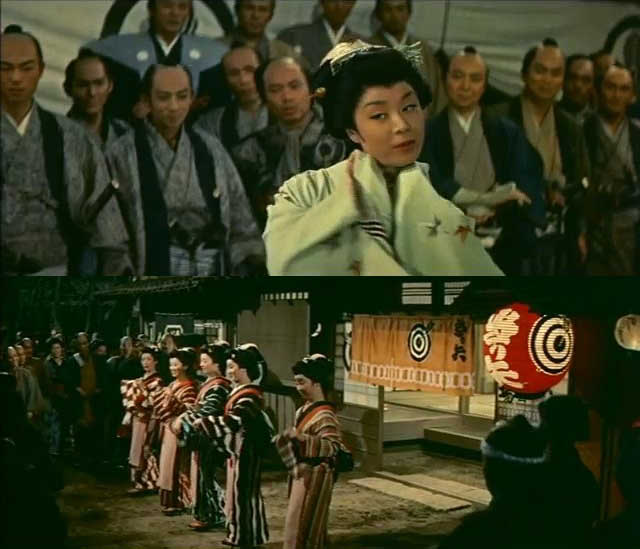The Bulls Eye of Love
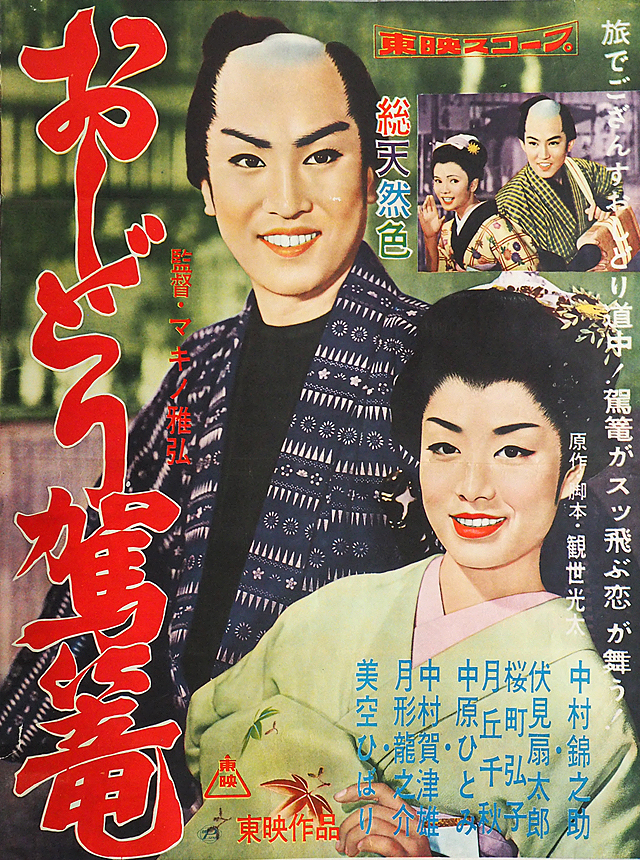
Year: 1959
Director: Masahiro
Makino
Rating: 7.0
This 1958 Japanese infectious confection
comes from Toei in FULL COLOR and TOEI-SCOPE! It is a samurai fairytale of
sorts. A fairytale in which a corrupt official is trying to take over a Clan
after the leader has died by killing the rightful heir and installing his
weak younger brother while a mad woman wanders the halls of the castle like
Ophelia and a Lord pretends to be a common plasterer to be with the woman
he loves and at one point has to battle 40 assassins singlehandedly. Oh,
and it's a musical.
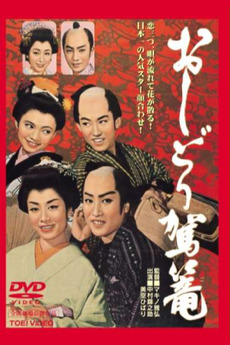
Musicals are not the first thing to come
to mind for most of us when thinking about Japanese film, but they have been
making them since 1933 and the director of this film Masahiro Makino was
behind the camera for one of Japan's most loved musicals, Singing Lovebirds
in 1939. But I gather that it was the 1940s and 50's where musicals were
at their most popular - similar to Hollywood. There were three female musical
performers who were huge stars - Misora Hibari, Chiemi Eri and Izumi Yukimura
during that period. There were also musicals being directed by Umetsugu Inoue
who would move over to the Shaw Brothers in the 1960's to direct a few classical
musicals. From the few I have seen Japanese musicals tend to be much less
ambitious and grand than American ones - you are not going to find the equivalent
of Busby Berkeley fantastical dance numbers or even a lot of dance at all.
They generally consist of melodic songs in solo or a duet or a few background
singers that will rarely bring the house down but are bright spots along
the way.
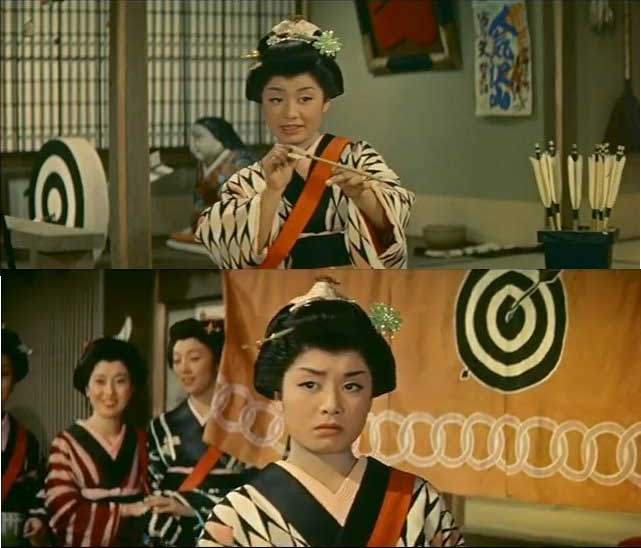
Of those three female singers, the one
I know best is Misora Hibari who was simply an enormous star for five decades
even though she died at 52 years old. Many compare her to Judy Garland -
a laser light on the stage but a rather sad life off. I prefer seeing the
similarities with Shirley Temple at least when she was just starting off.
Temple helped cheer up a nation while The Depression was occurring and Hibari
came to fame after WWII as a 12 year old in films like Sad Whistle and Tokyo
Kid in which she sang and danced herself into the hearts of Japanese movie
goers. She is enormously appealing in those early films in top hat and tails
and a crooked tooth smile that was a national monument. And she never slowed
down.
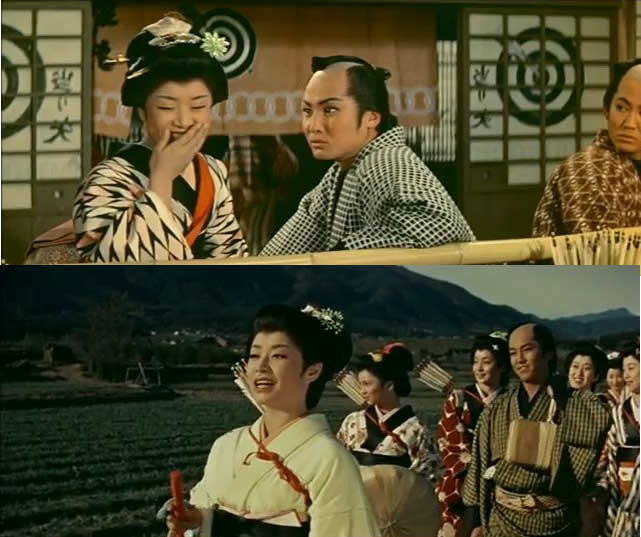
She made over 150 films of all kinds -
musicals but also dramas, love stories, adventure, samurai, detective. She
apparently even made films in which she plays a man; not a woman disguised
as a man but as a man. She made commercial fare. Popular for the people movies.
I don't think she ever made a film with Kurosawa or Ozu or Mizoguchi or any
of the other classical Japanese directors - she made movies that people went
to see with their family. I am clearly a big fan of hers - even have bought
a lot of her albums. Her popularity never crossed borders and I don't think
any of her films have been picked up by Western distributors but many are
available on the gray market.
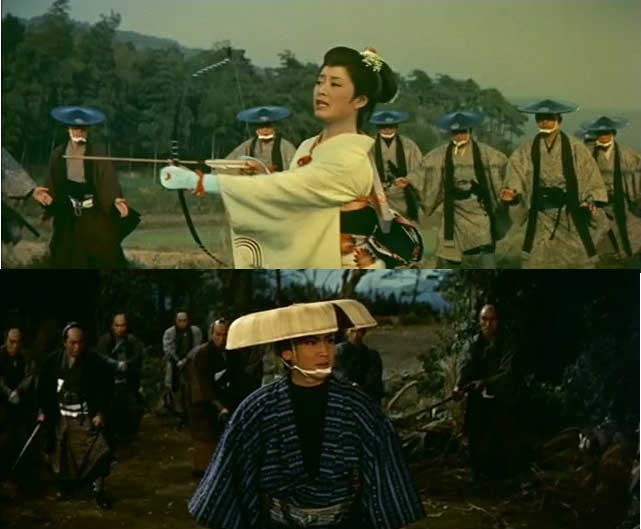
She is the star of this period film obviously.
In 1958 she was at the top of her game and film popularity. An absolute charmer.
The spunky Miss Kocho (Hibari) runs a small drinking establishment where
the big marketing ploy is that the men can sit around and shoot arrows at
targets while in the company of lovely kimono adorned women (a more interesting
version of darts I would say). I have seen this sort of establishment in
another period film so perhaps they really existed. She is in love with Genta
(Yorozuya Kinnosuke) a simple plasterer who hangs out with his friend pining
for the love of Miss Kocho, Both are afraid to be the first one to say I
Love You. Complications find the couple when two retainers of the Minaguchi
Clan come looking for Genta who is really Lord Genjiro that things have gotten
crazy back home and that he has to give up this life of a commoner and take
on his responsibilities. In the middle of all this Miss Kocho and her retinue
of hostesses/back up singers break into songs. A sweet little film though
I was hoping for a different ending. If I had been the director, this group
of seven women who follow Genta on his journey home and who are quite adept
with bow and arrow would have massacred the bad guys. At least that is how
Miike would have done it.
